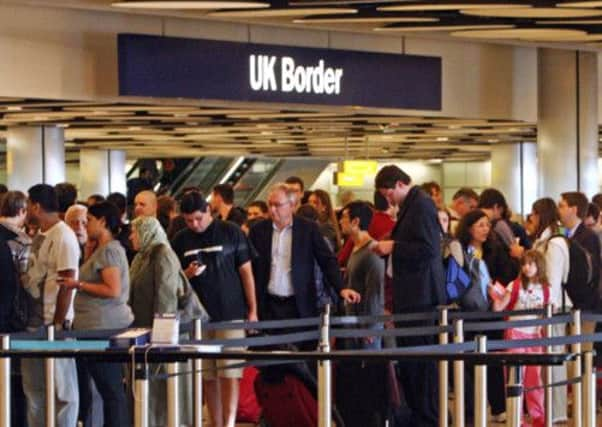Yvette Cooper: It’s time we talked about the true impact of immigration


Yet it is too important to our economy, our society and our future not to discuss. Some say for Labour to discuss immigration is to move to the Right.
Not so.
In fact, the free market liberal Right-wing approach has often been to promote wide open borders – in the interests of free markets, trade, and flexible, cheap labour.
Advertisement
Hide AdAdvertisement
Hide AdMeanwhile the Conservative Right-wing approach is to close the borders completely, with all outsiders kept out. Neither of those Right-wing extremes will ever work for Britain, or ever be accepted by Labour. We know we need a sensible balanced approach.
It is because immigration is important that it needs to be properly controlled. It is because immigration needs public support that the impact must be properly managed so it is fair for all. And yes, we need a serious debate about how to get that right.
Britain has benefited over many centuries from the amazing contributions of immigrants welcomed to our shores. New ideas, new talents and hard work from abroad have helped build our biggest companies, sustain our NHS, keep our public transport moving, win us Nobel prizes and expand our science base.
Britain has always been a safe haven for people fleeing violence and persecution – and must continue to be so. Last summer, the entire nation gathered behind T eam GB. A third of the team had parents or grandparents who came from abroad to make Britain their home.
Advertisement
Hide AdAdvertisement
Hide AdAnd we celebrated the strong, diverse and outward looking culture we showed off to the world.
For the future, immigration is likely to be even more important. Our top companies, our universities, and even our football teams and the Bank of England are competing in a global marketplace – dependent on recruiting the best international talent.
People are trading and travelling more than ever before. When my grandfather moved from Yorkshire to Lancashire in the 40s it would have been seen as a radical thing to do. Yet when his youngest grandson got married recently in America, relatives gathered from three different continents to celebrate.
Millions of British jobs are dependent on imports and exports – immigration has helped boost jobs and growth, and we know our children need to know about the world beyond our borders.
Advertisement
Hide AdAdvertisement
Hide AdSo we know that Britain cannot – and must not – pull up the drawbridge on the outside world. But we also know that immigration needs to work for all. And right now most people in Britain think it doesn’t.
Mass migration can create stresses and strains, making it harder for people to put down roots or build communities and, when resources are tight, creating economic and political tensions too.
Closing the door doesn’t work. But nor does having no controls at all.
The pace and scale of immigration matter. Controls matter, so does the kind of migration and the rules to keep things fair.
Advertisement
Hide AdAdvertisement
Hide AdThe impact of immigration matters. Immigration has to be managed so it works in the interests of Britain, and in the interests of working people.
Under Ed Miliband’s leadership, we’ve been holding events across the country – listening and talking about immigration in Britain. North and South, city and town. First and second generation migrants as well as families who have been in Britain for generations.
Along with Shadow Immigration Minister Chris Bryant, I’ve heard from people worried about whether their children will find jobs and whether they can compete with new arrivals from abroad. We’ve heard from people who have seen rapid change in their communities, worried they don’t know their neighbours any more.
And we’ve also heard from people worried about jobs being lost at the local university because fewer international students have come.
Advertisement
Hide AdAdvertisement
Hide AdWe’ve heard from people with many concerns about the way the immigration system works – and we need to talk about those problems. As Ed Miliband has said, we know Labour got some things wrong on immigration in government.
We did tackle many of the serious problems in the asylum system we inherited after 1997. We also brought in stronger border checks. But we should have been quicker to bring in the Australian-style points-based system.
We should have kept transitional controls for Eastern Europe.
And we should have looked more at the impact, and been ready to talk about problems.
Advertisement
Hide AdAdvertisement
Hide AdSo we know that needs to change. We will support the Government where it introduces sensible policies. And we will point out where they are getting things wrong. But we won’t enter an arms race of rhetoric on immigration – and we hope the Prime Minister won’t either.
That’s not honest, or good for Britain.
Instead we need a serious debate about the benefits and challenges from immigration, and about the practical measures needed to tackle the problems.
A future of ‘managed migration’
In her speech, Yvette Cooper said Britain needed “properly managed migration” which included:
- A stronger integration policy
- A fair system of controls and limits
- To recognise different kinds of migration with stronger action against illegal immigration, and a more effective system for the migration we need.
Advertisement
Hide AdAdvertisement
Hide Ad- Stronger action to stop exploitation and undercutting in the labour market.
- Short term and long term action on European migration for a fairer system.
She added: “As Ed Miliband has said, a One Nation immigration policy needs to work for all.”
* Yvette Cooper is the shadow home secretary. This is an edited version of the speech on immigration she gave yesterday at the Institute for Public Policy Research.